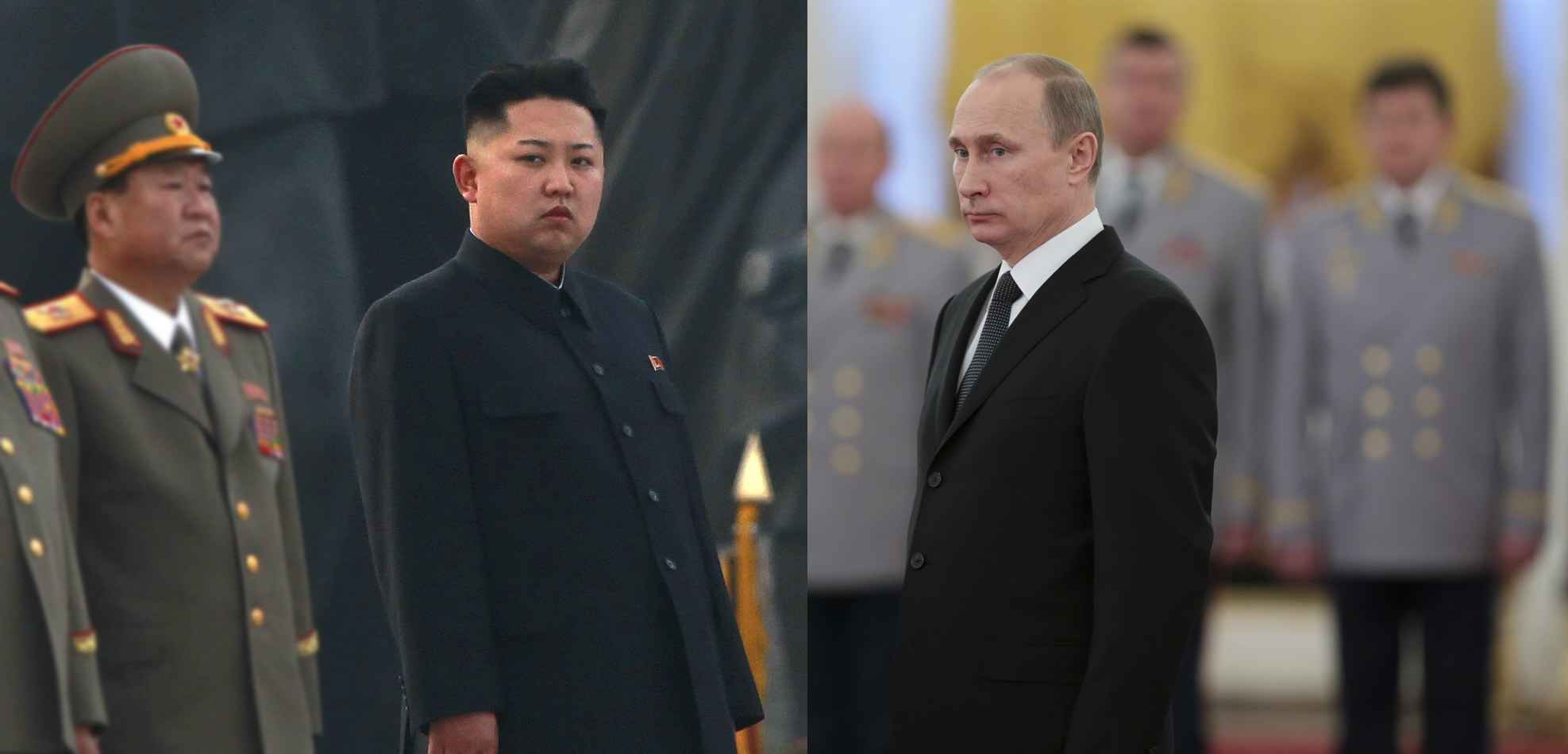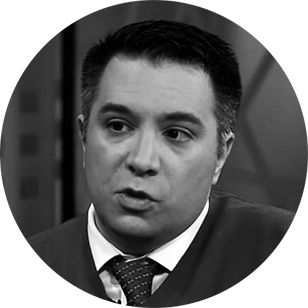How Vladimir Putin and Kim Jong Un could become partners in crime
It's time to start worrying about a Russia-North Korea alliance


A free daily email with the biggest news stories of the day – and the best features from TheWeek.com
You are now subscribed
Your newsletter sign-up was successful
You don't need to study international politics at Princeton to understand a basic truth: Shared enemies create shared interests. And shared interests create powerful reasons for nations that might not have much in common — even enemies — to work towards shared goals. Heck, they can even become allies if the stars align just right.
This is why Washington needs to start worrying about the possibility of an alliance it won't be thrilled about: Russia and North Korea. With both countries soon to be slapped with further sanctions by the United States, don't be shocked if Moscow tries to woo Pyongyang back into its orbit, an old pairing that once seemed fated to the history books.
In many respects, this is a reunion of old comrades who in the past aligned against America and the West. The then-USSR and North Korea were allies for decades, with Moscow providing important economic and military aid to Pyongyang. And when the Soviet Union collapsed, it was Russian scientists in search of cash who went to North Korea to jumpstart that nation's missile program. It's no coincidence that so many of Kim's mighty missiles look like old Soviet designs — from Russia with rocket fuel.
The Week
Escape your echo chamber. Get the facts behind the news, plus analysis from multiple perspectives.

Sign up for The Week's Free Newsletters
From our morning news briefing to a weekly Good News Newsletter, get the best of The Week delivered directly to your inbox.
From our morning news briefing to a weekly Good News Newsletter, get the best of The Week delivered directly to your inbox.
To be honest, this is something that seemed fated to happen. With Russia reeling from sanctions and increasingly isolated due to its military adventurism in Ukraine and Syria as well as its possible interference in the 2016 U.S. presidential campaign, Moscow is no doubt looking for important cards to play against America.
For North Korea — unless you have been living on Mars — America represents the ultimate of threats. Pyongyang must watch its back for a reason: When you have almost 200,000 people in prison camps, export what amounts to slave labor, and threaten to nuke most of Asia and America on a daily basis, you aren't exactly going to win a global popularity contest. That belligerence combined with Washington's military capabilities and its ability to impose regime change have driven Pyongyang to develop the ultimate weapon: nuclear warheads paired to ballistic missiles that could soon be able to kill millions in the continental United States.
Shared enemies plus shared interests equal shared goals. That means Vladimir Putin and Kim Jong Un could be partners in crime, developing deeper ties while eventually seeking to push back against Washington. Indeed, there even seems to be some evidence that this could already be happening.
Recent reports have noted how Russia-North Korea trade seems to be expanding quite dramatically. According to a widely cited article in USA Today, trade between the two nations was up 70 percent in the first two months of the year. The piece also details a "labor immigration agreement" that could expand the number of North Korean laborers used in Russia's timber and construction industries. Different reports indicate other economic linkages that could be expanded, such as Moscow selling Pyongyang 300,000 tons of oil products per year. If China decided to cut off fuel aid, with some reports suggesting that could already be in play, Russian exports could help fill the gap.
A free daily email with the biggest news stories of the day – and the best features from TheWeek.com
While all of the above clearly indicates Russian support for North Korea, none of it is a game changer. So, what would happen if Russia and North Korea really wanted to join forces? Military weapons transfers would really make the most sense.
Indeed, while North Korea might have an active army of over 1.1 million men, including 200,000 special forces and tons of chemical weapons and nuclear weapons, the bulk of Pyongyang's forces are antiques.
North Korea would have a long list of weapons it would love to acquire from Russia. Of the most immediate need would be advanced air defense systems to negate some of America's overwhelming advantage in the air. If Moscow were to provide Kim with the S-300 or more advanced S-400 air defense system in large enough numbers, Washington would have trouble taking out North Korea's nuclear weapons facilities and arsenal in the event of a crisis. Because such air defenses could do real damage against America's Cold War-era F-15, F-16, and F-18 fighters, America would need to heavily rely on its stealth platforms, like the B-2 bomber, F-22 fighter, and, in a few years, the F-35 as well as standoff weapons like the Tomahawk cruise missile. That would make attacking North Korea more difficult because Washington would have to mass these forces into the region, giving Kim a heads up about its plan.
There are, however, compelling reasons why Russia might not want to team up with North Korea beyond basic economics. For one, nothing screams international pariah more than backing a regime that likes to treat its citizens like slaves. Also, Beijing might have a thing or two to say if Moscow started bankrolling Pyongyang. China might not like the status quo, but Chinese President Xi Jinping won't be thrilled if Russia tried to become heavily involved in a state that Beijing has looked upon as an important buffer from the 28,000 American GI's stationed in South Korea.
But if history tells us anything, it's that necessity creates interesting partnerships. I personally won't be shocked if someday I wake up and see Putin and Kim shaking hands in Sochi. It could very well happen.
Harry J. Kazianis is director of defense studies at the Center for the National Interest, founded by former U.S. President Richard M. Nixon.
-
 Why is the Trump administration talking about ‘Western civilization’?
Why is the Trump administration talking about ‘Western civilization’?Talking Points Rubio says Europe, US bonded by religion and ancestry
-
 Quentin Deranque: a student’s death energizes the French far right
Quentin Deranque: a student’s death energizes the French far rightIN THE SPOTLIGHT Reactions to the violent killing of an ultraconservative activist offer a glimpse at the culture wars roiling France ahead of next year’s elections
-
 Secured vs. unsecured loans: how do they differ and which is better?
Secured vs. unsecured loans: how do they differ and which is better?the explainer They are distinguished by the level of risk and the inclusion of collateral
-
 Epstein files topple law CEO, roil UK government
Epstein files topple law CEO, roil UK governmentSpeed Read Peter Mandelson, Britain’s former ambassador to the US, is caught up in the scandal
-
 Iran and US prepare to meet after skirmishes
Iran and US prepare to meet after skirmishesSpeed Read The incident comes amid heightened tensions in the Middle East
-
 Israel retrieves final hostage’s body from Gaza
Israel retrieves final hostage’s body from GazaSpeed Read The 24-year-old police officer was killed during the initial Hamas attack
-
 China’s Xi targets top general in growing purge
China’s Xi targets top general in growing purgeSpeed Read Zhang Youxia is being investigated over ‘grave violations’ of the law
-
 Panama and Canada are negotiating over a crucial copper mine
Panama and Canada are negotiating over a crucial copper mineIn the Spotlight Panama is set to make a final decision on the mine this summer
-
 Why Greenland’s natural resources are nearly impossible to mine
Why Greenland’s natural resources are nearly impossible to mineThe Explainer The country’s natural landscape makes the task extremely difficult
-
 Iran cuts internet as protests escalate
Iran cuts internet as protests escalateSpeed Reada Government buildings across the country have been set on fire
-
 US nabs ‘shadow’ tanker claimed by Russia
US nabs ‘shadow’ tanker claimed by RussiaSpeed Read The ship was one of two vessels seized by the US military
